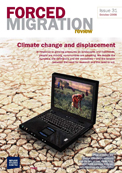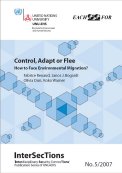(SciDevNet) October 21, 2011 – Ghana will experience increased flooding brought on by rising sea levels caused by global warming, a modelling study has predicted.
The study, published in Remote Sensing last month (7 September), says that about 650,000 people and almost 1,000 buildings in the three communities in the Dansoman area of Accra will be vulnerable to permanent flooding by 2100, as the shoreline recedes by more than 200 metres.
The study says natural and industrial sites will be submerged, and buildings made of commonly used sandcrete — building material made of cement and sand — will be destroyed by flooding. This will cause disease outbreaks, population displacements, loss of land and biodiversity, and decreased fishing catch and earnings, it
says.
Based on a SimClim — a computer model system for examining the effects of climate variability and change over time and space — it says this scenario is likely to affect negatively the nearby
Densu Ramsar wetland zone, a multi-million dollar salt industry, and local fisheries and farms. The study also revealed that local communities have no systems in place to help them adapt to the problem.
Kwasi Appeaning-Addo, the lead author from the University of Ghana, toldSciDev.Net that the study was mainly motivated by a public outcry over perennial high tides. His team wanted to contribute to knowledge about providing sustainable management and development strategies that deal with the problem.
The study could inform policy planning, said Appeaning-Addo. “The time to act is now,” he added.
According to Ghana’s Hydrological Services Department, the ocean claims 1.5 – 2 metres of Ghana’s 539 kilometre coastline annually, with the most risky areas recording four metres.
Kwabena Kankam-Yeboah, the principal research scientist at the Water Research Institute, in Ghana, said that the main way of dealing with surges of the sea predicted in the study is to adhere strictly to land-use policy and scientific engineering.
But he added the model used in the study was designed elsewhere for climatic conditions different from those in Ghana, which raises questions about its applicability.
Carl Fiati, officer in-charge of marine resources and coastlines in the Ghana Environmental Protection Agency, said that, although climate change is real, studies have not yet proved that rising sea levels and high tidal waves experienced in Ghana are caused by rising temperatures and changing climate.
Link to full paper in Remote Sensing.
Source: SciDevNet




The UN Emergency Relief Coordinator and other aid agency heads underlined the need to help communities become more resilient, so they could face extreme climate events rather than being forced to flee their homes permanently. Holmes said other mechanisms to raise money to help poor countries would have to be found. “Let’s face it,” he told IRIN, the amount needed will not be put on the table by the rich countries in Copenhagen.
However, Walter Kälin, Representative of the UN Secretary-General on the Human Rights of Internally Displaced Persons, said the message to donors was that they should rather fund initiatives to help poor countries adapt now, as “it will be much cheaper.”
Holmes, Kälin and António Guterres, the UN High Commissioner for Refugees, who also addressed a press briefing in Copenhagen, have been in the front line of providing assistance to people displaced by climate-related natural disasters, which are projected to become more frequent and intense in future. So-called environmentally induced migration is multi-level problem. According to Essam El-Hinnawi definition form 1985 environmental refugees as ―those people who have been forced to leave their traditional habitat, temporarily or permanently, because of a marked environmental disruption (natural or triggered by people) that jeopardised their existence and/or seriously affected the quality of their life. The fundamental distinction between `environmental migrants` and `environmental refugees` is a standpoint of contemporsry studies in EDPs.
According to Bogumil Terminski it seems reasonable to distinguish the general category of environmental migrants from the more specific (subordinate to it) category of environmental refugees.